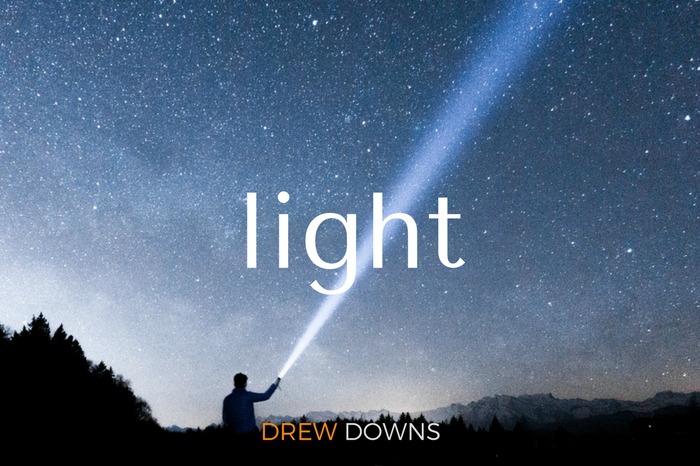In the beginning was the Word
When we read these words on Christmas morning, they feel like a counter to the words we hear the evening before.
We gather on Christmas Eve and hear the birth story from Luke, with its familiar moments of a baby born, swaddled, and laid down for bed in a manger.
Christmas Day | John 1:1-14
The Christmas story as we know it is so evocative of comforting images; of life as we wished it were: that in the midst of adversity, we can make a home of the street or a shed; we can make a crib from a trough; we can make a family out of an unplanned pregnancy.
There’s a life parallel we can really feel, the older we get.
So we hear John in this context and I don’t know about you, but I feel like John wants to shake up our thinking.
No, the story doesn’t begin with the birth. Or with Mary and Joseph. Elizabeth and Zechariah. With angels or visitations. It goes all the way back. Past Jerusalem and David, Moses, the patriarchs, the first human, to the beginning of creation itself.
And John says that at that time, the Word was already there.
Already There.
What does that mean?
In the US, we are fond of complex doctrines which undergird our faith. Or, more precisely, we like that there are complex doctrines which undergird our faith. We just don’t want to have to know them.
So for many this has a trinitarian feel. Jesus and God are one. It’s right there.
But perhaps not in the ways we’re taught in catechism or church school. John opens with a both/and view of GOD. Which has Jesus coming now and being around at the beginning. As being a companion to GOD and also being GOD.
For John, Jesus is the beautiful both/and.
But more importantly, Jesus then is beyond the baby and is precisely the baby. Both/and.
It’s funny, that every year, we gather to hear the story of a baby born, of GOD coming to dwell among us in a very tangible and literal way. For GOD to become incarnate: to be a human being in the flesh. This is the great Christmas miracle.
And yet, in our doctrine, our creeds, and in the public theology we share with one another, Jesus is the divine Word, cosmically beyond creation. Jesus the true Superman swooping down to save us.
In the human/divine paradox of Jesus, divine totally won.
But we love the day which reminds us Jesus isn’t only divine.
John doesn’t give us that. It seems quite the opposite. John seems to get us thinking about the divine Jesus, not the human.
But that doesn’t seem to be the gospel’s intention. Not when it points us instead to our own humanity.
John plays with both the human and the cosmic.
A persistent both/and.
The light shines in the darkness, and the darkness did not overcome it.
This is one of my favorite lines. The image of Jesus, the Christ, the Word of GOD coming as light in the midst of darkness is a palpable image. Particularly in our darkest month, in our darkest time, in lives which seem overwhelmed with it all.
But more subtle is the way John changes tenses to reveal to us the nature of Jesus, GOD, and humanity. In one concise statement.
The light shines in the darkness, and darkness did not overcome it.
It shines now because it was not overcome then.
It shines now and tomorrow it will not be overcome.
It shines now, but in the end, it was not overcome.
From where God sits, in the eternal present: past, present, and future are one: it wasn’t, isn’t, won’t be overcome. Today’s light wasn’t overcome by tomorrow’s darkness when we get there. A both/and.
And then, even the human becomes cosmic.
But to all who received him, who believed in his name, he gave power to become children of God
While Matthew takes great pains to avoid calling Jesus Son of God like the other would-be Messiahs and Luke puts that name upon him to be the ultimate Messiah, John does them all one better.
He puts the name upon us.
Through Jesus, we all become Sons and Daughters of God. We become Messiahs, anointed-ones. We become the divinely-inspired who liberate humanity. The light which shines in the darkness shines within us.
The cosmic Christ of John becomes the very humanity of his followers. Sons and Daughters of God!
We carry the light with us. Within us.
And the Word became flesh and lived among us, and we have seen his glory, the glory as of a father’s only son, full of grace and truth.
We have seen the light and become one with the light. We have become children of God.
Our bodies are the incarnation. They are the manifestation of GOD’s presence and the “glory as of a father’s only son, full of grace and truth.”
The power of the Christmas story isn’t found in its pastoral warm fuzzies, whichever one we embrace. It’s found in its communicating: in the telling and the receiving: in the witnessing and responding.
The power of the Christmas story is found in us and in our lives. In the work we do and in the community we build. We are God’s children, full of grace and truth.
Share that light wherever there is darkness. Whenever it’s dark. And it was not overcome.

